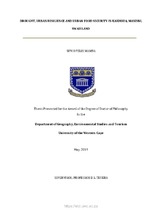| dc.description.abstract | Food security is the ability to secure an adequate daily supply of food that is affordable, hygienic and nutritious and it has become a chronic development problem in most urban areas of the global South. This thesis contributes to the urban food security debate by exploring the connection between drought and food security in urban Swaziland. Specifically, the study examines the effects of the 2015/16 drought on access to food in the informal settlement of kaKhoza in the city of Manzini. The study used climate change and food security conceptual framework to interrogate the connection between drought and food security in the urban context. The framework shows how climate change variables like extreme weather events (e.g. drought) impact food security drivers such as agricultural management, demographic, cultural and socio-economic variables, and how these drivers impact the four components of food security (food availability, access, utilization and stability of access).
The study drew from both the positivistic and interpretivistic paradigms and adopted a case study approach based on the mixed methods research design. Data was collected from the informal settlement of kaKhoza using a three step procedure involving a questionnaire survey, in-depth interviews, key informant interviews and focus group discussions. A questionnaire was administered to 145 heads of households using systematic sampling technique. Purposive sampling was employed to select 30 and 8 respondents for in-depth and key informant interviews, respectively. The researcher also engaged the observation method approach to capture additional information about effects of drought as observed in the study site. The researcher adhered to all legal and ethical procedures during the data collection and research writing processes. As such, participation in the research was strictly voluntary without any form of coercion, whatsoever.
The results reveal that drought contributes to food insecurity in low income urban spaces by reducing the quantity and frequency of free or low priced rural-urban food transfers. As a result, low income households have had to rely more on food purchases, thereby making them increasingly food insecure. The problem is compounded by reverse food flows from urban to rural areas. The drought induced food price hike, compelled many low-income households to be less dependent on the supermarket as the main source of their food, and to buy increased amounts of food from the vegetable markets and tuck shops. Residents employ different coping mechanisms to deal with drought induced food shortage, some of which are too risky and further expose them to food insecurity. These coping strategies include: skipping meals, begging, use of informal credit, over reliance on informal markets and selling of sexual favours, which expose respondents to HIV and AIDS infection. | en_US |

